San Francisco’s Transgender Income Assistance Program Faces Legal Challenge

Opponents of social support programs are attacking several measures in California that provide money to those in need. The Californians for Equal Rights Foundation, San Francisco resident Ruth Parker, and former mayoral candidate Ellen Lee Zhou have filed a lawsuit against San Francisco’s pilot Guaranteed Income for Trans People (GIFT) program. The lawsuit, reported by the Bay Area Reporter, targets the program and other income initiatives aimed at supporting artists, pregnant women, and Black individuals for their alleged discriminatory selection criteria.
The lawsuit, which initially included the San Francisco Unified School District and the Regents of the University of California as defendants, may see these parties removed due to limited involvement, as the San Francisco Chronicle reports. The plaintiffs argue that these programs, ushered in by Democratic Mayor London Breed, use public funds to discriminate based on race, ethnicity, sex, national origin, gender, gender identity, and sexual orientation, in violation of federal anti-discrimination laws.
"San Francisco denies that the programs in question are unlawful or unconstitutional in any manner. We look forward to discussing these matters further in court," said Alex Barrett-Shorter, deputy press secretary for City Attorney David Chiu, according to the Bay Area Reporter.
The importance of the GIFT program extends beyond financial assistance. For the transgender community in San Francisco, a group often faces unique challenges, including higher rates of unemployment and homelessness, this program represents a crucial lifeline. It not only aids in alleviating immediate financial pressures but also serves as a recognition and validation of the struggles faced by trans people.
Californians for Equal Rights Foundation, a key plaintiff in the lawsuit, is a conservative group that has been vocal in its opposition to what it perceives as “woke culture,” often challenging initiatives related to diversity, equity, and inclusion and the oft-invoked right-wing bogeyman critical race theory. The group’s involvement in this lawsuit aligns with its broader agenda of contesting policies and programs that it argues prioritize specific groups, thereby, in its view, creating “reverse discrimination” scenarios.
The city has denied wrongdoing in these programs, with officials eager to address these issues in court. The Bay Area Reporter adds that the lawsuit’s outcome could significantly impact the structure and administration of public assistance programs, especially those aimed at marginalized communities.
Additionally, the San Francisco Chronicle reports that the controversy surrounding these programs extends beyond the legal arguments. There are broader implications for how cities nationwide approach similar initiatives to uplift underrepresented communities. The debate touches on critical issues of equity and inclusion, challenging policymakers to find a balance between targeted support and adherence to anti-discrimination laws.
The Advocate has reached out to Breed’s office for comment.
In response to the lawsuit, community leaders and advocates have voiced concerns about the potential impact on vital support systems for marginalized groups. These programs have been crucial in providing financial stability to segments of the population that often face systemic barriers.

